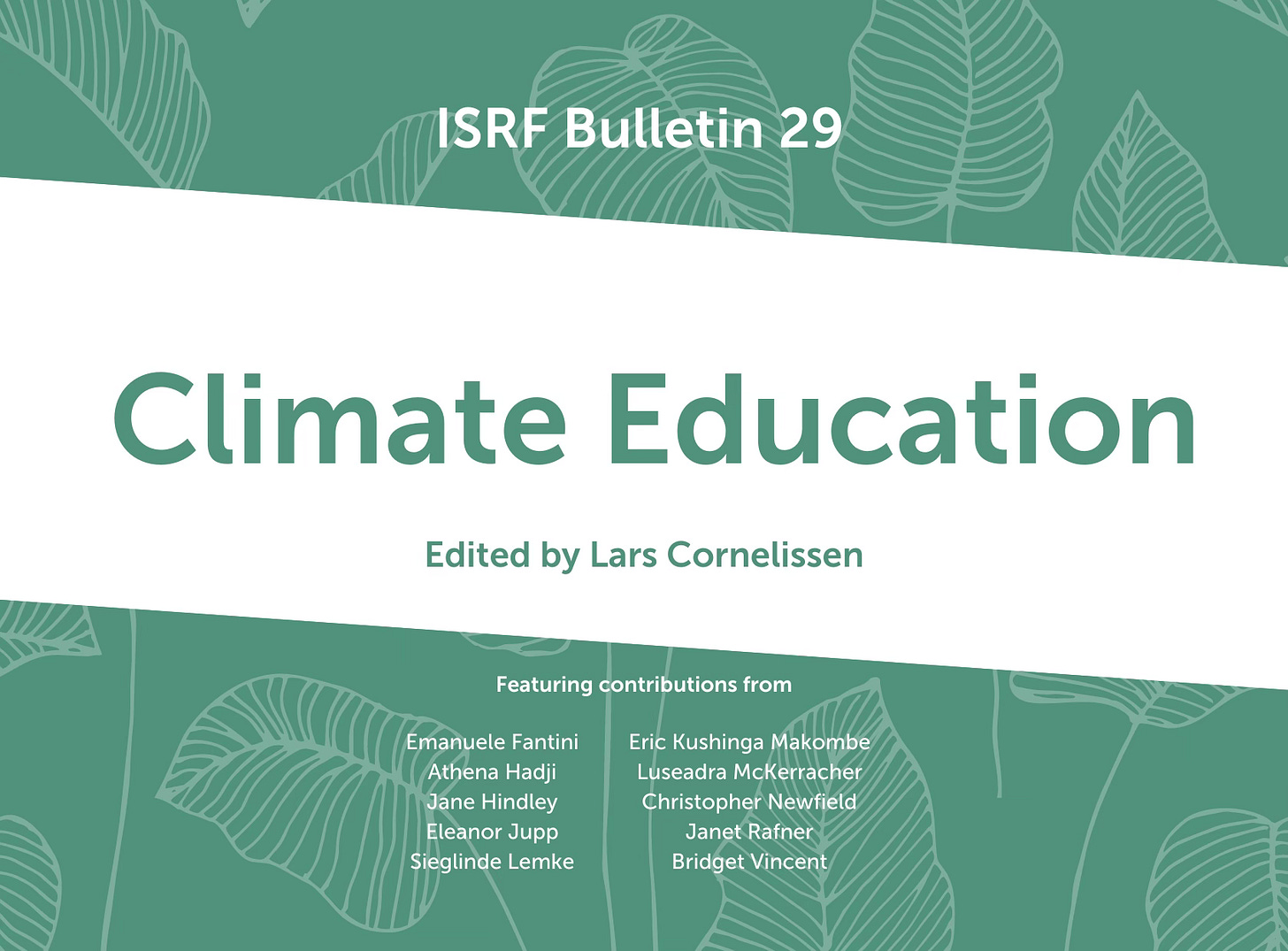ISRF Bulletin 29: Climate Education
Contributions explore new critical pedagogies, identify gaps in education and research funding, and argue that climate education, to be meaningful, must also always be climate activism.
This ISRF Bulletin brings together a number of papers presented at the ISRF’s 2023 conference. Asking where higher education sits in the fight for a green transition, contributions explore new critical pedagogies, identify gaps in education and research funding, and argue that climate education, to be meaningful, must also always be climate activism.
Editorial
Dr Lars Cornelissen, ISRF Academic Editor
This issue of the Bulletin brings together seven papers that were presented at the ISRF’s last annual conference, held in Bologna, Italy, in November 2023. The conference thematic was Climate Crisis, Global Capitalism, and Higher Education.
The papers in this issue look in particular at how the first and third of these themes intersect: what role do higher education institutions have in making a green transition thinkable, achievable, desirable? How are the flaws of our higher education system preventing this work from taking place? And how can critical pedagogies help push back against climate scepticism, pessimism, or defeatism?
The issue opens with an introductory piece by the ISRF’s Director of Research, Christopher Newfield. Reflecting back on the Bologna conference, he draws together some of the main themes and observes that there’s a great amount of energy and will among educators to push for change. What needs to be done is to challenge the inertia of those in power and to build new narratives to replace the conventional wisdom that has placed us on a disastrous course.
In her piece, Athena Hadji shares a number of distinct but interrelated thoughts about the way the climate crisis intersects with and reflects the crisis of Humanities knowledge. What the Humanities offer is the ability to tell stories, old or new, not with the aim to profit or to provide comfort but to reinterpret the world and our place within it so as to prompt change. As the prestige of the Humanities has declined, so has our ability to build critical perspectives. Now, as Hadji concludes, “it is time our voice was heard.”
Also focused on pedagogy is Jane Hindley, whose contribution reconstructs her efforts to design a new pedagogical approach to sustainability, one that moves beyond the Sustainable Development Goals and their notable lack of ambition. Taking inspiration from Paolo Freire, Naomi Klein, and the methods developed by the Centre for Alternative Technology, she outlines what a pedagogy looks like that conceives of higher education as site not just of climate study but also climate activism.
In his paper, Eric Kushinga Makombe develops a systematic review of the state of climate research and climate education in Zimbabwe. As he shows, there exists a gap between the Zimbabwean government’s stated ambitions in this area and the university sector’s ability to meet them. While each of the country’s nine universities have ambitious and promising climate programmes in place, a lack of funding and a prioritisation of STEM research to the detriment of HASS approaches has created stark limits that will need to be overcome.
Addressing the theme of ecopedagogy, Sieglinde Lemke takes us through a number of different approaches that have developed within this field over the last half century. While all agree that education is key to achieving a sustainable lifestyle, the question is what such education should look like. For Lemke, education for sustainability will inevitably fail if it limits itself to training individuals qua individuals. Instead, the aim should be to develop a holistic culture of sustainability, in which sustainable values are reflected not just in consumption patterns or individual beliefs but in intersecting ways of acting, thinking, and being.
Eleanor Jupp’s paper asks how university researchers can contribute to climate justice in their own local areas. Reporting on a period of fieldwork she completed in an oft-stigmatised and under-resourced area of Chatham, Kent, she talks about the very acute sense local inhabitants have of the issues they face with pollution, poor health, and bad infrastructure, as well as of the close links between each of these. Talking about her experience working with a visual artist, she holds out that digital technologies are helpful tools in charting these issues and mapping them onto the local environment.
In their paper, Bridget Vincent, Luseadra McKerracher and Janet Rafner discuss a teaching protocol they’re developing, called Close Reading Climate Change. They argue that close reading methods help students cope with hugely complex questions by teaching them how to sit with uncertainty, have difficult conversations, and constructively disagree with one another. They argue that critical pedagogy can help us to disentangle some of the vexing issues that surround climate (in)action, including questions of complicity and collective responsibility and draw out a number of concrete insights that point in this direction.
The issue closes with a piece by Emanuele Fantini, who explores the critical uses of podcasting as a research and teaching method in climate questions. Building on the case study of the Italian water movement, which in the early 2010s successfully pushed back against efforts to privatise water access in Italy, he asks what strategic and theoretical lessons we can learn from this experience. He argues that narrative building was key to the movement’s success and, on this basis, advocates the use of podcasts in the effort to build student awareness of the importance of narrative, voice, and active listening.
Together, these papers keep up the important work of thinking through and testing climate pedagogies. The broader themes of climate change and the green transition will remain central to the ISRF’s agenda going forward. In October 2024, the Foundation is hosting its next annual conference on the theme of Migration and Democracy in a Time of Climate Crisis, where we will continue this conversation.
Featuring contributions from Emanuele Fantini, Athena Hadji, Jane Hindley, Eleanor Jupp, Sieglinde Lemke, Eric Kushinga Makombe, Luseadra McKerracher, Christopher Newfield, Janet Rafner, and Bridget Vincent.


